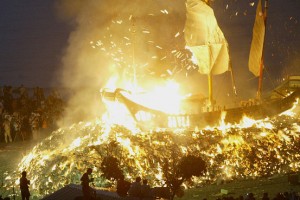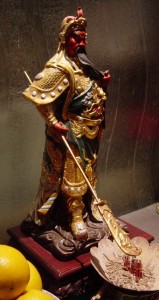Performers are Mean People
/ Beijing Opera (Jingju) has as its most basic physical training something called "da" literally hitting or striking. The warm ups I learned as a kid studying Northern Shaolin are the very same ones used in Beijing Opera. The stage roles are divided into either martial or civil categories (wu and wen). Extensive weapons training is given to everyone because much of the traditional repertoire involves depicting historic conflicts and battles. Probably the best piece of evidence is the most famous Chinese Opera star of the 20th Century, the female impersonating dan Mei Lanfeng, studied Baguazhang with one of the toughest internal martial artists of his time! It was said to have improved his sword dance.
Beijing Opera (Jingju) has as its most basic physical training something called "da" literally hitting or striking. The warm ups I learned as a kid studying Northern Shaolin are the very same ones used in Beijing Opera. The stage roles are divided into either martial or civil categories (wu and wen). Extensive weapons training is given to everyone because much of the traditional repertoire involves depicting historic conflicts and battles. Probably the best piece of evidence is the most famous Chinese Opera star of the 20th Century, the female impersonating dan Mei Lanfeng, studied Baguazhang with one of the toughest internal martial artists of his time! It was said to have improved his sword dance.Yet people will tell you that Chinese Opera has nothing to do with martial arts.
Beijing Opera is just one of many forms of physical theater in China. There are urban regional styles like what Jackie Chan studied as a kid and there are rural regional styles. There are also village lineage families, and there are amateur village and regional styles. And within all of those categories there are ritual styles. This is a quick gloss to give readers a sense of the scope--there were probably more than a hundred styles of physical theater in 19th Century China.
But there is a big problem here. Denial.
Jackie Chan has said in variously self deprecating ways that he doesn't know about fighting. And although it is well known that the Physical Theater of the Red Junks was created by the first Wing-Chun masters, it is also reported that they kept their fighting skills entirely separate from their performing skills. Even today tight lines of distinction are drawn---at least in peoples minds---despite the fact that the stances used in fighting and performing are the same, and it is hard to know when a martial arts form has crossed-over into theater.
And everyone knows that Bruce Lee left Hong Kong for the US because he wanted to come here and teach Cha-Cha, right? It's true.
Martial artists go to great lengths to deny any links to performing arts; the "New Life" and other nationalists movements in the 20th Century set out to completely separate martial arts from religious ritual and theater. Sometimes they went ahead and just changed the arts, like Yang and Wu styles of taijiquan. For example, Chen, the older style, is chockablock with pantomime training. Other times they just discarded whole categories of practice, like back bends and high kicks, and sometimes they went for straight faced denial: "No, that movement isn't for cueing the music, it's for poking your eyes out!"
Mean People!
I have not even finished reading David Johnson's new book, Spectacle and Sacrifice, The Ritual Foundations of Village Life in North China, but the chapter on Entertainers is so astounding I just had to blog!
Entertainers (yuehu) were a degraded caste in China. Long time readers of this blog may know that I was deeply shocked and offended by my experiences of caste in India in the 1990's. Chinese culture is not nearly as shocking to my American sensibilities, but then again, I've been studying Chinese martial arts for 32 years and no one has ever spelled it out to me as clearly as Johnson does in his book.
An entertainer had to move off to the side of the road to let "good people" pass.
[Performers] were known as jianmin, "mean people": they could not marry commoners, could not sit for examinations, and could not change their status. In some cases they were required to be on call to the local yamen to entertain at banquets and other occasions. (Just what their responsibilities were is never made clear, but they may well have included sexual services.) They were treated with contempt by the general population....
While there were two major categories of entertainers, there were also castes within castes. The basic categories were coarse (cu) and fine (xi), generally it appears that the coarse played music and the fine played music but also had acting skills.
 "Mean people" were used for everything from entertaining visiting dignitaries, to weddings, to the most sacred rituals of a region. "Opera Families" were profane outsiders who lived in separate districts or separate villages and yet were paid to entertain and purify--to bring order and expel evil.
"Mean people" were used for everything from entertaining visiting dignitaries, to weddings, to the most sacred rituals of a region. "Opera Families" were profane outsiders who lived in separate districts or separate villages and yet were paid to entertain and purify--to bring order and expel evil.A caste of hated artists brings to mind Roma (Gypsy) culture in Europe [hat tip to Liu Ming for the analogy]. The "mean people" were considered profane, but they were a necessity for the maintenance of the sacred. Ritual Theater was the most common and widespread religious experience in China before the 20th Century. (Here are some links to previous posts.)
There were many different types of ritual performance throughout the calender year and every single village handled things differently. So it is important to note that amateur commoners performed important roles in rituals and theater, as did Daoist priest, Buddhist monks, Yinyang masters, military personal, local elites, children and even high officials. In fact, I think it is fair to say that some village rituals had a role for everyone.
 Which brings us back to martial arts. Martial arts were used extensively in these rituals. It seems almost too obvious that the basic physical training for popular and rarefied physical theater in China was in fact martial arts training. Each region had it's own style of gongfu (kung fu) and it's own style of theater (ci). But the basic training was the same. It could be refined for either fighting, performing, or both.
Which brings us back to martial arts. Martial arts were used extensively in these rituals. It seems almost too obvious that the basic physical training for popular and rarefied physical theater in China was in fact martial arts training. Each region had it's own style of gongfu (kung fu) and it's own style of theater (ci). But the basic training was the same. It could be refined for either fighting, performing, or both.What I've just now realized is that the ideology of modernity functioned in China as a cover for the deep animosity towards the performing castes. These castes are now probably close to extinction. Of course it's risky to generalize, but we now have a better explanation of why most martial arts lineages did everything they could to deny their past participation in ritual performance (lion dance being the big exception). While the entertainer castes were officially liberated, their historic vocation as ritual experts was derided as the root cause of China's humiliations and failures as a nation! I suspect that in some cases individual artists from degraded castes managed to survive by first denying any connection to ritual theater, and then skillfully transforming themselves into pure martial artists.
Now I have to re-think what qigong is in this context. Kind of gives a different meaning to the expression "secret teaching," doesn't it?
(Remember if you are reading this on facebook you can see more images by clicking "original context" below.)
